These short stories interrogate the mysteriousness of human life and relationships and they’re some of the best stories I read in the first half of 2024.
‘Sky Bar’ by Katherine Heiny
In ‘Sky Bar’ from Katherine Heiny’s collection Games and Rituals we meet Fawn and discover there is nothing left for her in her home town of Hullbeck – apart from her parents and her bad memories of school and marriage. Fawn’s delayed flight leads her to the Sky Bar where she is joined by a motley trio of drinking buddies who later take her on a joy ride, and ‘It’s just like high school. Only now it’s fun.’
‘Looking at her [the young bartender] gives Fawn post-traumatic flashbacks to her own teen years. (Some people say time is like a river, but it’s really much more like an accordion, constantly squeezing you back to high school.) … She never wants to see anyone she went to high school with ever again.’
The story explores how we try to reinvent ourselves to escape the past, the disjuncture that can occur when we visit old stamping grounds, and the liberation we can feel when new acquaintances don’t know about our past and can accept us at face value. It’s intriguing, compelling and really well done.
PS: ‘CobRa’ in which empty nester Rachel has taken up KonMari, tidying up the house on the advice of Marie Kondo’s book, and ‘Twist and Shout’ in which Erica heads home to her elderly father’s house because he has mistakenly eaten his hearing aid because he thought it was a cashew, are great stories too.
Katherine Heiny is the author of two collections of short stories: Games and Rituals and Single, Carefree Mellow. Her fiction has been published in The New Yorker, The Atlantic, Ploughshares, Glimmer Train, and many other places. She lives in Washington, D.C., with her husband and children.
‘Oh Sister, My Sister’ by Oksana Zabuzhko
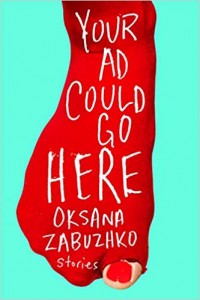 The voice in ‘Oh Sister My Sister’ is astonishingly good and the story is brilliant. It comes from Your Ad Could Go Here by Oksana Zabuzhko, translated by Halyna Hryn. A little girl gleans enough of what is going on around her to know that her ‘sister’ has been lost from her mother’s womb. It is through her eyes as a girl and then a woman that we see the destructive nature of war and its long-lasting terrors. We also see how war is never disembodied and how we seek to console ourselves with the presences people leave in their absences.
The voice in ‘Oh Sister My Sister’ is astonishingly good and the story is brilliant. It comes from Your Ad Could Go Here by Oksana Zabuzhko, translated by Halyna Hryn. A little girl gleans enough of what is going on around her to know that her ‘sister’ has been lost from her mother’s womb. It is through her eyes as a girl and then a woman that we see the destructive nature of war and its long-lasting terrors. We also see how war is never disembodied and how we seek to console ourselves with the presences people leave in their absences.
Several KGB agents are in the house and the girl’s mother is scared: ‘It was perhaps at that moment, when she rushed to take you into her arms, to embrace and shield you with her whole body, that a realisation flashed through your mother’s mind, an obscure, alarming truth: She would not be able to shield the both of you. She had no room for two. Thus you, by virtue of your fully realised irrevocable presence in this world, edged your sister out of it.’
Zabuzhko says of the short story form: ‘For me a good story is a novel. Or more precisely, a bud of a novel, with tiny petals inside inviting a reader to open them in their imagination.’ Also: ‘In a short story, you are your character’s equal, a stranger, a passerby, a remote acquaintance with an observer’s eye.’ Yes!
Oksana Zabuzhko is Ukraine’s major contemporary writer, the author of more than twenty books of different genres (poetry, fiction, essays, criticism). Among her numerous acknowledgements are MacArthur Grant (2002), Antonovych International Foundation Prize (2008), the Ukrainian National Award the Order of Princess Olha (2009), Shevchenko National Prize of Ukraine (2019), and many other national and international awards. Her opus magnum, The Museum of Abandoned Secrets (2010), won Angelus Central European Literary Prize (2013) for the best novel of Eastern and Central Europe, and Your Ad Could Go Here (2017) was listed by the New York Times among 100 best books of 2020 from around the world.
‘Thornhope, Indiana’ by Jon Gingerich
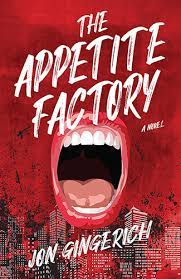 Haunted by the loss of his brother, Carl yearns to leave behind the family farm with the reminder of his brother’s accident and death all around him, including ‘the concrete cap’ where the silo had been. Carl is having an affair with a relative’s wife, but she refuses to leave town with him because of her kids. We want to believe Carl can escape his desperation, but it becomes increasingly clear as he prepares to depart that he may not.
Haunted by the loss of his brother, Carl yearns to leave behind the family farm with the reminder of his brother’s accident and death all around him, including ‘the concrete cap’ where the silo had been. Carl is having an affair with a relative’s wife, but she refuses to leave town with him because of her kids. We want to believe Carl can escape his desperation, but it becomes increasingly clear as he prepares to depart that he may not.
‘Thornhope, Indiana’ is deep, disturbing and full of tenderness. It’s also a feast of great paragraphs (here’s one): ‘He wondered if other cultures recognised how messy grief could be sometimes, the unfair expectations we put on ourselves to say and feel the right things, to ensure the adequate public display of aggrievement is being expressed. To spell out what he couldn’t put into words anyway, like the months he’d spent wondering if he could hear Richard’s voice in the house if he concentrated hard enough. How he’d squint and imagine him there, racing to the edge of the field on the four-wheeler, waving back for Carl to catch up. He couldn’t help feeling guilty at how relieved he’d been that he wasn’t thinking about Richard as much as he used to, or Carl’s memory of him, which wasn’t the same thing. And almost on top of the thought he was asleep, and had the same dream he had every night.’
Jon Gingerich is an author, magazine editor, and writing instructor based in New York. His short stories have been published in The Saturday Evening Post, The Malahat Review, Pleiades, Grist, Stand Magazine, The Oyez Review, Helix Magazine and others. He’s a graduate of The New School’s creative writing MFA program. In 2019, Jon’s short story, ‘Thornhope, Indiana’ won The Saturday Evening Post’s 2020 Great American Fiction Contest. In 2022, his debut novel, The Appetite Factory, was published by Turner Publishing Company. Jon is legally blind, the result of retinitis pigmentosa, a rare, progressive eye disease that causes vision loss.
‘More of this World or Maybe Another’ by Barbara Johnson
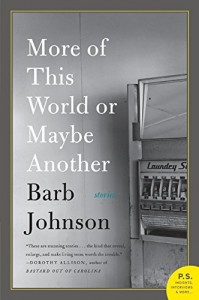 ‘More of this World or Maybe Another’ is the title story in Barbara Johnson’s award-winning collection of the same name. The collection features four outsiders whose rickety lives intersect on the back streets of New Orleans. The title story finds a stoned teenage Delia longing to kiss a girl named Chuck in an empty oil tank – a moment out of time that is both touching and other-worldly.
‘More of this World or Maybe Another’ is the title story in Barbara Johnson’s award-winning collection of the same name. The collection features four outsiders whose rickety lives intersect on the back streets of New Orleans. The title story finds a stoned teenage Delia longing to kiss a girl named Chuck in an empty oil tank – a moment out of time that is both touching and other-worldly.
‘Delia looks down, and already that world seems small and strange. The world of the tank is the real world now. She’s queasy with excitement. … When they reach the top of the stairs, three stories up, they stand on a small platform, their shoulders nearly touching. Delia squints at the view. Everything’s out of proportion, and it makes her feel big and small at the same time. … Across the river a scatter of lights. The high school’s over there, and beyond that, Delia’s house, which, if she could see it, would be in a dark field, surrounded by other dark fields, lit only by the pale fruit of egrets sleeping in the trees along the bayou. Everything is so small and far away.’
Barb Johnson worked as a carpenter in New Orleans for more than 25 years before embarking on a career in writing. She won Glimmer Train’s Short Story Award for New Writers and Washington Square’s fiction competition. Her fiction has also appeared in such magazines as The Southern Review, The Greensboro Review, 52 Stories, Yemmassee, Baltimore Review, Guernica, and Oxford American. She teaches fiction writing in the MFA program at the University of New Orleans.
‘Prints’ by Amanda Davis
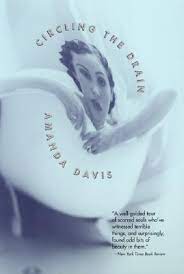 ‘Amanda Davis writes gently, even poetically, about extraordinary brutality,’ Mary Elizabeth Williams noted in her review of Circling the Drain for the New York Times Book Review. And this is true of ‘Prints’, in which a woman is haunted by the memory of her murdered older sister, who went missing when the woman was a child.
‘Amanda Davis writes gently, even poetically, about extraordinary brutality,’ Mary Elizabeth Williams noted in her review of Circling the Drain for the New York Times Book Review. And this is true of ‘Prints’, in which a woman is haunted by the memory of her murdered older sister, who went missing when the woman was a child.
‘Lucy! I screamed and spun around. Lucy! Lucy! Lucy! The field was a green sheet cake surrounded by a ring of tiny trees and I was its centrepiece, a ballerina, a hollow figurine. … It was only after all the looking that they found the bones. Years later, under a hunter’s cabin sixty miles away in Cleryton.’
Two other stand-out stories are ‘Red Lights Like Laughter,’ which features a couple stuck in a hotel room during a blizzard and ‘Faith, or Tips for the Successful Young Lady,’ which shows how a previously overweight teenager eradicates her demons.
Amanda Davis – In March 2003, while on a national book tour to promote her debut novel Wonder When You’ll Miss Me, Amanda Davis was killed when the single-engine plane she was flying in crashed into a mountain some 18 miles from Asheville, North Carolina. Her father, who was piloting the plane, and her mother, were also killed in the accident. Davis’s first short story collection Circling the Drain was published in 1999 and reviewers said it showcased her talent and heralded an interesting literary career ahead. Sadly, this was not to be.
‘Briar Road’ by Jonathan Buckley
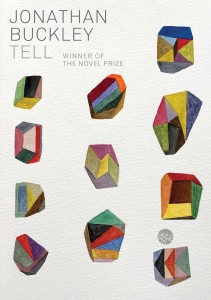 In ‘Briar Road’ a woman with uncanny insight visits a family whose daughter is missing. The woman has been right before about the fate of other missing people. She asks to see the daughter’s room, which turns out to be the one slightly disorderly room in a house of cleanliness and constraint. The relationship between the father and mother is very strained too; and this lack of intimacy suggests this awkwardness has not just arisen now their daughter is missing. The missing girl’s sister and brothers also appear to be almost featureless, even though we are given a few details about them. Buckley’s story is eerie – and I think he achieves this with taut prose that works hard without seeming to. The father is shown to be a bit of a seedy and controlling character, and his presence hangs over the story like a storm.
In ‘Briar Road’ a woman with uncanny insight visits a family whose daughter is missing. The woman has been right before about the fate of other missing people. She asks to see the daughter’s room, which turns out to be the one slightly disorderly room in a house of cleanliness and constraint. The relationship between the father and mother is very strained too; and this lack of intimacy suggests this awkwardness has not just arisen now their daughter is missing. The missing girl’s sister and brothers also appear to be almost featureless, even though we are given a few details about them. Buckley’s story is eerie – and I think he achieves this with taut prose that works hard without seeming to. The father is shown to be a bit of a seedy and controlling character, and his presence hangs over the story like a storm.
‘The father finds my voice agreeable, I can tell, though he is inclined to dislike me. But he would describe himself as a man who likes women, and as a man whom women tend to find attractive. This is obvious. Some years ago he was unfaithful, his eyes tell me, as does the glance that his wife gives him; he will be unfaithful again, I am sure. … His wife leads me to the stairs and up to the daughter’s bedroom. She opens the door gently, as if the girl may be asleep inside. ‘This is it,’ she says, in a whisper. Side by side, in the doorway, we look into the little room; there is a bunk bed, with a small desk below, and a chest of drawers, and an area of unoccupied carpet large enough for just one adult to lie within it. I take a step forward. ‘I’ll leave you,’ she says, and the door silently closes on me.’
Jonathan Buckley is a writer and editor from the West Midlands, now living in Brighton. In 2015 he won the BBC National Short Story Award for ‘Briar Road’, and he is a regular contributor to the Times Literary Supplement. Tell, his twelfth novel, was the joint winner of The Novel Prize in 2022 and was published simultaneously in 2024 by Giramondo Publishing (AU), New Directions (US) and Fitzcarraldo Editions (UK). It probes the ways in which we make stories of our own lives and of other people’s
‘Junket’ by Lauren Groff
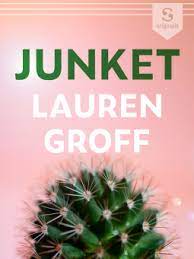 In Lauren Groff’s ‘Junket’ a writer is offered an all-expenses-paid residency at an exclusive retreat in Arizona, but its affluence provides many challenges along with its balm. In a meditation session, she and some other women are guided to ‘let the gratitude into the heart’ and the writer is incensed by the realisation that gratitude means something very different to these women than it does to the poor. Why should these women require such expensive rest and relaxation to cope with their lives?
In Lauren Groff’s ‘Junket’ a writer is offered an all-expenses-paid residency at an exclusive retreat in Arizona, but its affluence provides many challenges along with its balm. In a meditation session, she and some other women are guided to ‘let the gratitude into the heart’ and the writer is incensed by the realisation that gratitude means something very different to these women than it does to the poor. Why should these women require such expensive rest and relaxation to cope with their lives?
‘Gratitude to people like these women should probably mean that they are so cognisant of the astonishing luck they have been born into that they have no choice but to become Florence Nightingale, Mother Teresa, Gandhi, Dolly Parton, or a host of lesser lights who care for the sick and sad and imperilled.’
At another point, the protagonist thinks, ‘Perhaps, to rich people, it is the waste itself that is the calming thing. Please, if you have to waste, waste your diamonds into the pockets of the world’s artists, all you sons and daughters of ease.’
She also notes: ‘The wealthy come to places like this to be treated as great tender babies, she thinks. Bathe us. Massage us, oil us, soothe us, and wrap us in the softest cloth like our bodies are precious and prone to breaking, they are quietly begging by coming here. But oh God, how good it feels to be a baby.’
The friend who has arranged the junket, gifts the writer a session with The Mother and, despite the writer’s cynicism, she complies. When it’s almost over, there is ‘a black seepage from the anklebones’ and The Mother declares the writer blessed.
Groff told Oprah that ‘The Mother’ experience in ‘Junket’ is drawn from a personal encounter she’d had that had changed her in ‘metaphysical’ but also somewhat ‘solipsistic’ ways. ‘I had to look at myself and my understanding of the world and recognise how little I know about the mysteries of existence.’
She also said: ‘Reading is also writing. Even if nothing is being produced, that’s fine: Artists are not little baby capitalists. We don’t always have to produce everything all the time to be part of the larger project of literature.’
Lauren Groff is a three-time National Book Award finalist and The New York Times bestselling author of the novels The Monsters of Templeton, Arcadia, Fates and Furies, Matrix, and The Vaster Wilds, and the celebrated short story collections Delicate Edible Birds and Florida. She has won The Story Prize, the ABA Indies’ Choice Award, France’s Grand Prix de l’Héroïne, and the Joyce Carol Oates Prize, and has been a finalist for the National Book Critics Circle Award. Her work regularly appears in The New Yorker, The Atlantic, and elsewhere. Her work has been translated into thirty-six languages. She lives in Gainesville, Florida.
‘Australia Square’ by Georgia Blain
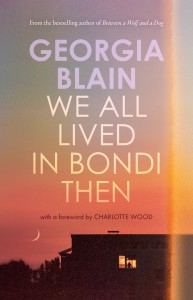 ‘Australia Square’ is the opening story in We All Lived in Bondi Then by Georgia Blain and it is marvellous. Published almost eight years after Georgia’s death from cancer in 2016, the book’s nine stories continue her trademark brilliance, including its incisive observation and elegant prose.
‘Australia Square’ is the opening story in We All Lived in Bondi Then by Georgia Blain and it is marvellous. Published almost eight years after Georgia’s death from cancer in 2016, the book’s nine stories continue her trademark brilliance, including its incisive observation and elegant prose.
In ‘Australia Square’, a baby boy goes missing, but reappears some time later. Decades on, his sister looks back and wonders if the dropping of a stuffed toy had set the wheels in motion that led to the baby’s loss, the family’s breakdown and her brother’s ongoing psychotic episodes – and that without this incident, whether a whole different trajectory might have unfolded for her family.
I loved the story and this quote: ‘He worked on the forty-seventh floor, in an office that looked out over the pale haze of the city skyline, the sweep of new roads and construction, toy-like beneath him. Years later, when he told me how much his job bored him, he admitted to loving the distance of that view, the world small and quiet and calm, far away in its silence.’
This is also great: ‘She was here for a week, she said. If I had time to see her again, she would like that. She kissed me on the cheek and for an instant I felt like a child again, back in my bed, Mathilde leaning over me, whispering good night. “Bon nuit, ma petite, bon nuit.”’
Georgia Blain published novels for adults and young adults, essays, short stories, and a memoir. Her first novel was the bestselling Closed for Winter, which was made into a feature film. Her books have been shortlisted for numerous awards including the NSW, Victorian, and SA Premiers’ Literary Awards, the ALS Gold Medal, the Stella Prize, and the Nita B. Kibble Award for her memoir Births Deaths Marriages. Georgia’s works include The Secret Lives of Men, Too Close to Home, and the YA novel Darkwater. In 2016, Georgia published Between a Wolf and a Dog and the YA novel Special (Penguin Random House Australia). Between a Wolf and a Dog was shortlisted for the 2017 Stella Prize, and was awarded the 2017 Victorian Premier’s Literary Award for Fiction and the 2016 University of Queensland Fiction Book Award. Georgia passed away in December 2016.
‘The Twelfth of Never’ by Gurnak Johal
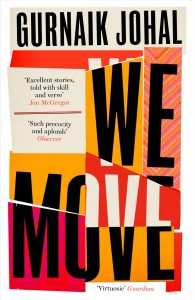 ‘The Twelfth of Never’ is from Gurnak Johal’s debut collection, We Move, which won the 2023 Somerset Maugham Award. The book is mostly set in an area of West London and offers insights into multiple generations of immigrants. It was hard to choose one story to feature from the wide range of wonderful pieces. In the end, I chose ‘The Twelfth of Never’ because of its music-based theme and incredible time span (from 1741 to 2020), which is cleverly used to shape the narrative.
‘The Twelfth of Never’ is from Gurnak Johal’s debut collection, We Move, which won the 2023 Somerset Maugham Award. The book is mostly set in an area of West London and offers insights into multiple generations of immigrants. It was hard to choose one story to feature from the wide range of wonderful pieces. In the end, I chose ‘The Twelfth of Never’ because of its music-based theme and incredible time span (from 1741 to 2020), which is cleverly used to shape the narrative.
Here are some quotes to whet your appetite for the rest of the story and other pieces in We Move.
‘The carcass arrived. The butcher separated the cuts, hiding a few chops of the rack for himself. He left the intestines to soak.’
…
‘When the patch of sunlight reached the wall, he put on their song, an old recording from the 60s that Priyanka found on Spotify. As the first verse began, she opened her eyes. It was moments like this, he thought, that memory couldn’t do justice. That was the thing, you couldn’t look back and dissect joy, you just had to let it in, a breeze on a warm morning, eyelashes unfurling, the chorus beginning.’
‘The Lawn Party’ by Ann Beattie
 ‘The Lawn Party’ appears in Ann Beattie: The New Yorker Stories, which contains a plethora of short stories I could have nominated here as ‘best’.
‘The Lawn Party’ appears in Ann Beattie: The New Yorker Stories, which contains a plethora of short stories I could have nominated here as ‘best’.
Each Beattie story, says Margaret Atwood, is ‘like a fresh bulletin from the front: we snatch it up, eager to know what’s happening out there on the edge of that shifting and dubious no-man’s-land known as interpersonal relations.’
In ‘The Lawn Party’, a man has had his arm amputated after an accident. He also refuses to come out of his room at his parents’ house as his perch allows him to both watch the croquet game taking place on the lawn below and not have to engage in chit chat. He drinks his beer alone and endures visits to the room by several people attending the party, including his brother’s wife Danielle who asks him, ‘Are you feeling blue today or just being rotten.’ To which he replies, ‘Both.’
Here’s another portion from the story that I found poignant.
‘She [his wife Mary] had nothing more to do with her sister. I, on the other hand – strange how many things one cannot say anymore – saw her whenever possible. Patricia – that was her name – went with me on business trips, met me for lunches and dinners, and was driving my car when it went off the highway.
‘When I came to, Mary was standing beside my hospital bed, her face distorted, looking down at me. “My sister killed herself and tried to take you with her,” she said.
I waited for her to throw herself on me in pity.
‘You deserved this,’ she said, and walked out of the room.
Ann Beattie has been included in five O. Henry Award Collections, in The Best American Short Stories and The Best American Short Stories of the Century. She is the recipient of the PEN/Malamud Award for achievement in the short story. In 2005, she received the Rea Award for the Short Story. The former Edgar Allan Poe Professor of Literature and Creative Writing at the University of Virginia, she is a member of The American Academy of Arts and Letters and of the American Academy of Arts and Sciences. She and her husband, Lincoln Perry, live in Maine, Virginia, and Florida.
‘Peach Cobbler’ by Deesha Philyaw
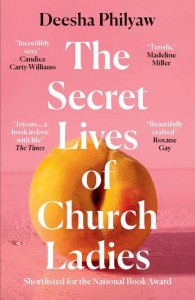 ‘Peach Cobbler’ is one of nine stories in Deesha Philyaw’ debut collection The Secret Life of Church Ladies and it is devastating. A young girl thinks the preacher is God because he visits their house every Monday and every Monday her mother has baked him a Peach Cobbler, which only he is allowed to eat. Once, when her mother and the preacher disappeared into the bedroom, the girl went to the door and listened and heard her mother crying out ‘Oh God, oh God, oh God’ and the preacher saying ‘Yes, Yes, Yes’ which further confirmed her theory. The scales fall off the young girl’s eyes when she is a teen herself, curvaceous and attracted to the preacher’s son. In the end the fallout is terrible, and it took my breath away.
‘Peach Cobbler’ is one of nine stories in Deesha Philyaw’ debut collection The Secret Life of Church Ladies and it is devastating. A young girl thinks the preacher is God because he visits their house every Monday and every Monday her mother has baked him a Peach Cobbler, which only he is allowed to eat. Once, when her mother and the preacher disappeared into the bedroom, the girl went to the door and listened and heard her mother crying out ‘Oh God, oh God, oh God’ and the preacher saying ‘Yes, Yes, Yes’ which further confirmed her theory. The scales fall off the young girl’s eyes when she is a teen herself, curvaceous and attracted to the preacher’s son. In the end the fallout is terrible, and it took my breath away.
Deesha Philyaw is an American author, columnist and public speaker. Her debut, The Secret Lives of Church Ladies, won the 2021 Pen/Faulkner Award, the 2020/2021 Story Prize, and the 2020 LA Times Book Prize for First Fiction and was shortlisted for the National Book Award. It is currently being adapted for television by HBO Max. Deesha is also a Kimbilo Fiction Fellow and and a Baldwin for the Arts Fellow.
Her debut novel, The True Confessions of First Lady Freeman, is forthcoming from Mariner Books, an imprint of HarperCollins, in 2025.

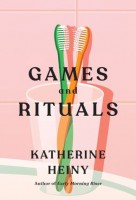


Recent Comments